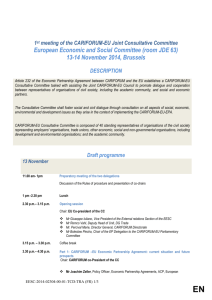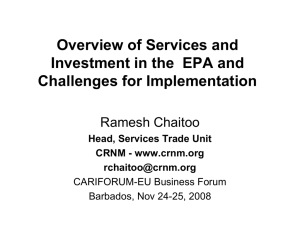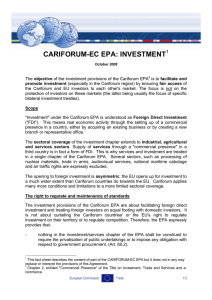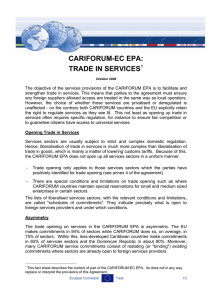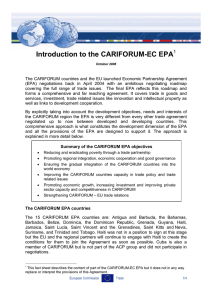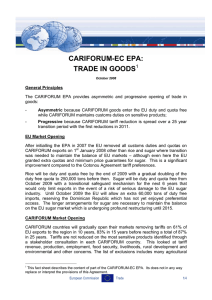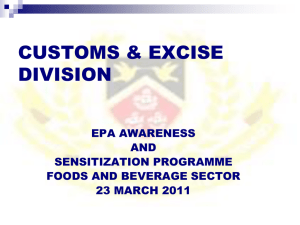CARIFORUM-EC EPA: INNOVATION AND INTELLECTUAL PROPERTY 1
advertisement
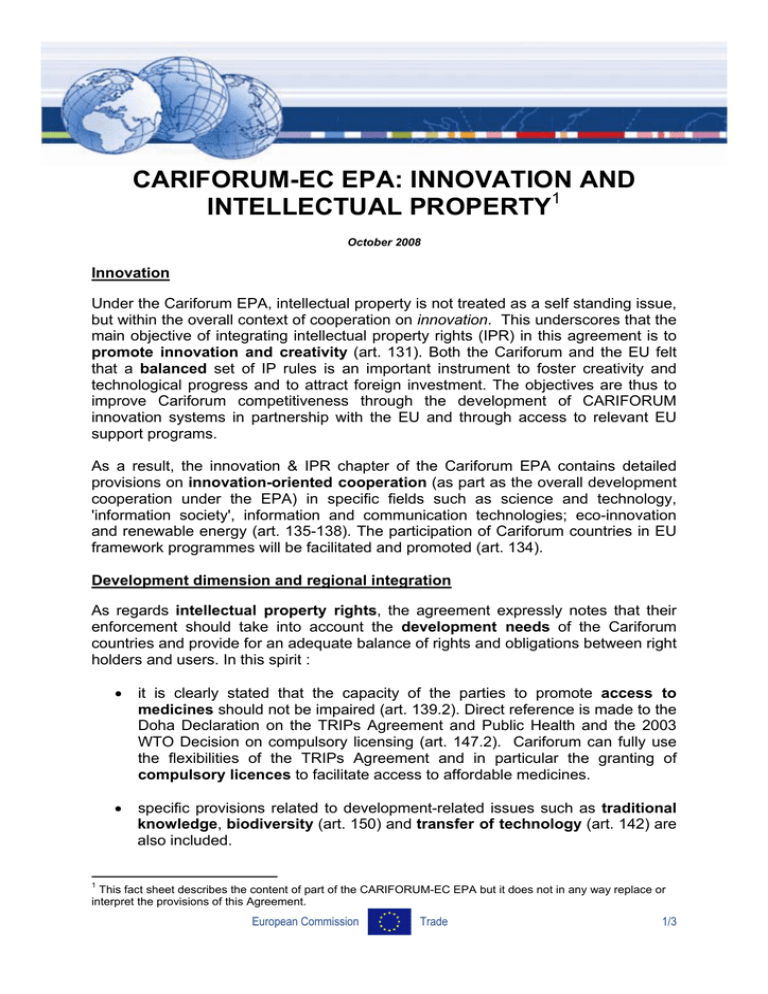
CARIFORUM-EC EPA: INNOVATION AND INTELLECTUAL PROPERTY1 October 2008 Innovation Under the Cariforum EPA, intellectual property is not treated as a self standing issue, but within the overall context of cooperation on innovation. This underscores that the main objective of integrating intellectual property rights (IPR) in this agreement is to promote innovation and creativity (art. 131). Both the Cariforum and the EU felt that a balanced set of IP rules is an important instrument to foster creativity and technological progress and to attract foreign investment. The objectives are thus to improve Cariforum competitiveness through the development of CARIFORUM innovation systems in partnership with the EU and through access to relevant EU support programs. As a result, the innovation & IPR chapter of the Cariforum EPA contains detailed provisions on innovation-oriented cooperation (as part as the overall development cooperation under the EPA) in specific fields such as science and technology, 'information society', information and communication technologies; eco-innovation and renewable energy (art. 135-138). The participation of Cariforum countries in EU framework programmes will be facilitated and promoted (art. 134). Development dimension and regional integration As regards intellectual property rights, the agreement expressly notes that their enforcement should take into account the development needs of the Cariforum countries and provide for an adequate balance of rights and obligations between right holders and users. In this spirit : • it is clearly stated that the capacity of the parties to promote access to medicines should not be impaired (art. 139.2). Direct reference is made to the Doha Declaration on the TRIPs Agreement and Public Health and the 2003 WTO Decision on compulsory licensing (art. 147.2). Cariforum can fully use the flexibilities of the TRIPs Agreement and in particular the granting of compulsory licences to facilitate access to affordable medicines. • specific provisions related to development-related issues such as traditional knowledge, biodiversity (art. 150) and transfer of technology (art. 142) are also included. 1 This fact sheet describes the content of part of the CARIFORUM-EC EPA but it does not in any way replace or interpret the provisions of this Agreement. European Commission Trade 1/3 • as regards protected plant varieties, the agreement contains a provision that leaves the signatories the freedom to provide exemptions to so-called "plant breeders' rights" that will allow farmers to save, use and exchange farm-saved seed (Art. 149.2). This "farmers' exemption" allows farmers to re-use IP protected seed saved from their harvest, rather than having to buy them again each year. It is a unique feature which is found in no other agreement between developed and developing countries; • long implementation periods are foreseen (2014), and several provisions are couched in "best endeavour" terms, allowing Cariforum states to implement them only if and when they feel ready to do so. • the LDC member of Cariforum (i.e. Haiti) will not have to implement the IPR chapter until 2021 at the very earliest. A further objective in EPA Cariforum is the strengthening of regional capacity for dealing with IPR issues in the Cariforum States. The EPA builds on regional integration initiatives and aims at pushing such initiatives forward. In this respect, the EU commits to provide significant technical assistance and capacity building to Cariforum. Commitments on IPRs For well-established IPRs like copyright, trademarks, or patents, the Cariforum EPA contains no detailed provisions. Rather, reference is made to adherence to or compliance with the main relevant international conventions, either in the form of a firm commitment or in the form of a best-endeavours clause (meaning that Cariforum countries can adhere when they feel ready to do so). On patents, for instance, Cariforum states have committed to adhere to the Patent Cooperation Treaty – in so far as they have not yet done so (Art. 147). The Patent Cooperation Treaty establishes a procedure for the filing of a single international patent application, which allows inventors to obtain a patent, through one single application, in several countries of their choice (rather than having to file separate patent applications in various countries) 2 . This agreement only concerns patent application procedures – i.e. on patents, the EPA does not commit Cariforum countries to substantive patent rights beyond those already contained in the TRIPs Agreement. On trademarks, reference is made to the Madrid Protocol which simplifies the application procedure for trademarks. On copyright, there is a provision on the facilitation of arrangements between copyright collecting societies in order to ensure that right holders from both Cariforum and EU are adequately remunerated for the use of their music or other artistic works 2 Patents are usually granted by national or regional patent offices. The ensuing patent protection is then limited to the country or the region (or part of the region) covered by a national or regional patent office. The advantage of the Patent Cooperation Treaty (PCT) is that it provides for the filing of a single international patent application which has the same effect as national applications filed in the countries which are designated countries. An applicant seeking protection may file one application and request protection in as many signatory states as needed. This will make it easier for Cariforum investors to obtain patent rights in other countries. European Commission Trade 2/3 in the EU or the Cariforum countries. In particular, it should make it easier for Caribbean artists to get properly rewarded for use of their works in the EU (Art. 143.2) On other rights for which there are no major international conventions, i.e. geographical indications (GIs) and designs, as well as on enforcement, the Agreement sets out some framework provisions. With respect to Geographical indications (art.145), in the absence of a regulatory framework in the Cariforum countries, the EPA provides for a rendez-vous clause according to which no later than 1 January 2014 the Cariforum countries will establish a system of protection for GIs. On that date, the EU and Cariforum will enter into negotiation for a fully fledged agreement on GIs. The current GI provisions also aim at fostering cooperation to identify and promote GIs in Cariforum countries via the active involvement of the Trade and Development Committee established by the EPA. Geographical Indications (GIs) as development tools GIs are names or signs used on certain products which correspond to a specific geographical location or origin (e.g. a town, region, or country). The use of a GI may act as a certification that the product possesses certain qualities, or enjoys a certain reputation, due to its geographical origin. GIs constitute the main pillar of the EU’s quality policy on agricultural products, but they can also play a valuable role in developing countries to create a genuine niche for development of agri-food industries. GI products constitute a genuine interest for producers as they unlock value by capitalising on consumers desire for diversity and typical quality products. French GI cheeses are sold at an average of 2 euro per kilo more than French non-GI cheeses. French “Poulet de Bresse” has a market price 4 times higher than regular French chicken. Producers of Italian “Toscano” olive oil have managed to increase prices for their olive oil by 20% since it was registered as a GI in 1998. The same results could be achieved for typical Caribbean products, such as for instance the famous "Blue Mountain" Coffee of Jamaica. In particular the combination of geographical indications (guaranteeing origin and quality of a product) with fair trade schemes (guaranteeing sustainable production conditions) can be a powerful development tool. Enforcement The Cariforum EPA includes significant procedures on enforcement of IPRs, i.e. the measures and procedures to be put in place to ensure effective implementation of the already existing IPR rules. In this respect, the provisions on enforcement aim to ensure that the legislation of the signatory countries gives the Cariforum and EU right holders the necessary tools to defend these rights effectively. These tools include civil and administrative measures and procedures and border enforcement measures. This is important to ensure that Cariforum and EU right holders can effectively benefit from their rights. Special cooperation shall be provided by the EU to that effect, including measures to reinforce the regional dimension of IP protection in Cariforum. European Commission Trade 3/3
